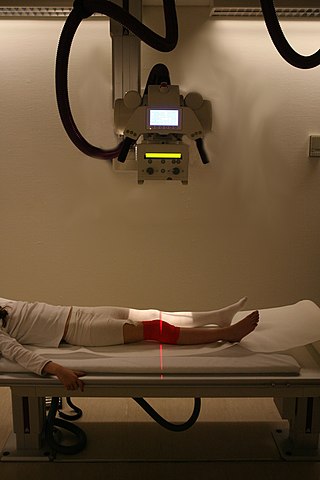
Hypochondriasis or hypochondria is a condition in which a person is excessively and unduly worried about having a serious illness. Hypochondria is an old concept whose meaning has repeatedly changed over its lifespan. It has been claimed that this debilitating condition results from an inaccurate perception of the condition of body or mind despite the absence of an actual medical diagnosis. An individual with hypochondriasis is known as a hypochondriac. Hypochondriacs become unduly alarmed about any physical or psychological symptoms they detect, no matter how minor the symptom may be, and are convinced that they have, or are about to be diagnosed with, a serious illness.

Health informatics is the study and implementation of computer structures and algorithms to improve communication, understanding, and management of medical information. It can be viewed as branch of engineering and applied science.
An orphan drug is a pharmaceutical agent that is developed to treat certain rare medical conditions. An orphan drug would not be profitable to produce without government assistance, due to the small population of patients affected by the conditions. The conditions that orphan drugs are used to treat are referred to as orphan diseases. The assignment of orphan status to a disease and to drugs developed to treat it is a matter of public policy that depends on the legislation of the country.
In healthcare, a differential diagnosis (DDx) is a method of analysis of a patient's history and physical examination to arrive at the correct diagnosis. It involves distinguishing a particular disease or condition from others that present with similar clinical features. Differential diagnostic procedures are used by clinicians to diagnose the specific disease in a patient, or, at least, to consider any imminently life-threatening conditions. Often, each individual option of a possible disease is called a differential diagnosis.

A medical device is any device intended to be used for medical purposes. Significant potential for hazards are inherent when using a device for medical purposes and thus medical devices must be proved safe and effective with reasonable assurance before regulating governments allow marketing of the device in their country. As a general rule, as the associated risk of the device increases the amount of testing required to establish safety and efficacy also increases. Further, as associated risk increases the potential benefit to the patient must also increase.
Cyberchondria, otherwise known as compucondria, is the unfounded escalation of concerns about common symptomology based on review of search results and literature online. Articles in popular media position cyberchondria anywhere from temporary neurotic excess to adjunct hypochondria. Cyberchondria is a growing concern among many healthcare practitioners as patients can now research any and all symptoms of a rare disease, illness or condition, and manifest a state of medical anxiety.
A clinical decision support system (CDSS) is a health information technology that provides clinicians, staff, patients, and other individuals with knowledge and person-specific information to help health and health care. CDSS encompasses a variety of tools to enhance decision-making in the clinical workflow. These tools include computerized alerts and reminders to care providers and patients, clinical guidelines, condition-specific order sets, focused patient data reports and summaries, documentation templates, diagnostic support, and contextually relevant reference information, among other tools. CDSSs constitute a major topic in artificial intelligence in medicine.
Self-diagnosis is the process of diagnosing, or identifying, medical conditions in oneself. It may be assisted by medical dictionaries, books, resources on the Internet, past personal experiences, or recognizing symptoms or medical signs of a condition that a family member previously had or currently has.
DXplain is a Clinical decision support system (CDSS) available through the World Wide Web that assists clinicians by generating stratified diagnoses based on user input of patient signs and symptoms, laboratory results, and other clinical findings. Evidential support for each differential diagnosis is presented, along with recommended follow-up that may be conducted by the clinician to arrive at a more definitive diagnosis. The system also serves as a clinician reference with a searchable database of diseases and clinical manifestations.

Medical diagnosis is the process of determining which disease or condition explains a person's symptoms and signs. It is most often referred to as a diagnosis with the medical context being implicit. The information required for a diagnosis is typically collected from a history and physical examination of the person seeking medical care. Often, one or more diagnostic procedures, such as medical tests, are also done during the process. Sometimes the posthumous diagnosis is considered a kind of medical diagnosis.
Computers and software have been used in dental medicine since the 1960s. Since then, computers and information technology have spread progressively in dental practice. According to one study, in 2000, 85.1% of all dentists in the United States were using computers.
Healthcare CRM, also known as Healthcare Relationship Management, is a broadly used term for a Customer relationship management system, or CRM, used in healthcare.
Chronic Lyme disease (CLD) is the name used by some people with non-specific symptoms, such as fatigue, muscle pain, and cognitive dysfunction to refer to their condition, even if there is no evidence that they had Lyme disease. Both the label and the belief that these people's symptoms are caused by this particular infection are generally rejected by medical professionals. Chronic Lyme disease is distinct from post-treatment Lyme disease syndrome, a set of lingering symptoms which may persist after successful antibiotic treatment of infection with Lyme-causing Borrelia bacteria, and which may have similar symptoms to CLD.
Babylon Health was a digital-first health service provider that combined an artificial intelligence-powered platform with virtual clinical operations for patients. Patients are connected with health care professionals through their web and mobile application.
Digital therapeutics, a subset of digital health, are evidence-based therapeutic interventions driven by high quality software programs to prevent, manage, or treat a medical disorder or disease. Digital therapeutic companies should publish trial results inclusive of clinically meaningful outcomes in peer-reviewed journals. The treatment relies on behavioral and lifestyle changes usually spurred by a collection of digital impetuses. Because of the digital nature of the methodology, data can be collected and analyzed as both a progress report and a preventative measure. Treatments are being developed for the prevention and management of a wide variety of diseases and conditions, including type 1 & type II diabetes, congestive heart failure, obesity, Alzheimer's disease, dementia, asthma, substance abuse, ADHD, hypertension, anxiety, depression, and several others. Digital therapeutics often employ strategies rooted in cognitive behavioral therapy.

Artificial intelligence in healthcare is a term used to describe the use of machine-learning algorithms and software, or artificial intelligence (AI), to copy human cognition in the analysis, presentation, and understanding of complex medical and health care data, or to exceed human capabilities by providing new ways to diagnose, treat, or prevent disease. Specifically, AI is the ability of computer algorithms to arrive at approximate conclusions based solely on input data.
The ICD coding for rare diseases is the International Classification of Diseases code used for the purpose of documenting rare diseases. It is important for health insurance reimbursement, administration, epidemiology, and research. Of the approximately 7,000 rare diseases, only about 500 have a specific code. However, more than 5400 rare diseases are included in ICD-11 and can be recorded using an ICD-11 URI. An ICD code is needed for a person's medical records—it is important for health insurance reimbursement, administration, epidemiology, and research. Finding the best ICD code for a patient who has a rare disease can be a challenge.

Merative L.P., formerly IBM Watson Health, is an American medical technology company that provides products and services that help clients facilitate medical research, clinical research, real world evidence, and healthcare services, through the use of artificial intelligence, data analytics, cloud computing, and other advanced information technology. Merative is owned by Francisco Partners, an American private equity firm headquartered in San Francisco, California. In 2022, IBM divested and spun-off their Watson Health division into Merative. As of 2023, it remains a standalone company headquartered in Ann Arbor with innovation centers in Hyderabad, Bengaluru, and Chennai.

Noémie Elhadad is an American data scientist who is an associate professor of Biomedical Informatics at the Columbia University Vagelos College of Physicians and Surgeons. As of 2022, she serves as the Chair of the Department of Biomedical Informatics. Her research considers machine learning in bioinformatics, natural language processing and medicine.
An orphan device is a product or an equipment intended for the prevention, prediction, diagnosis, support, treatment or management of a life-threatening or chronically debilitating disease with a low prevalence/incidence, most notably for rare diseases. Orphan medical technology is then considered as both the medical device and the connectivity of the device. Many orphan devices provide essential functions for patients with rare diseases, their carers, and the healthcare professionals using them. Nevertheless, there are very few medical devices that are specifically developed for rare diseases. At the same time, many patients and carers express a substantial unmet need for new medical devices for their conditions.







